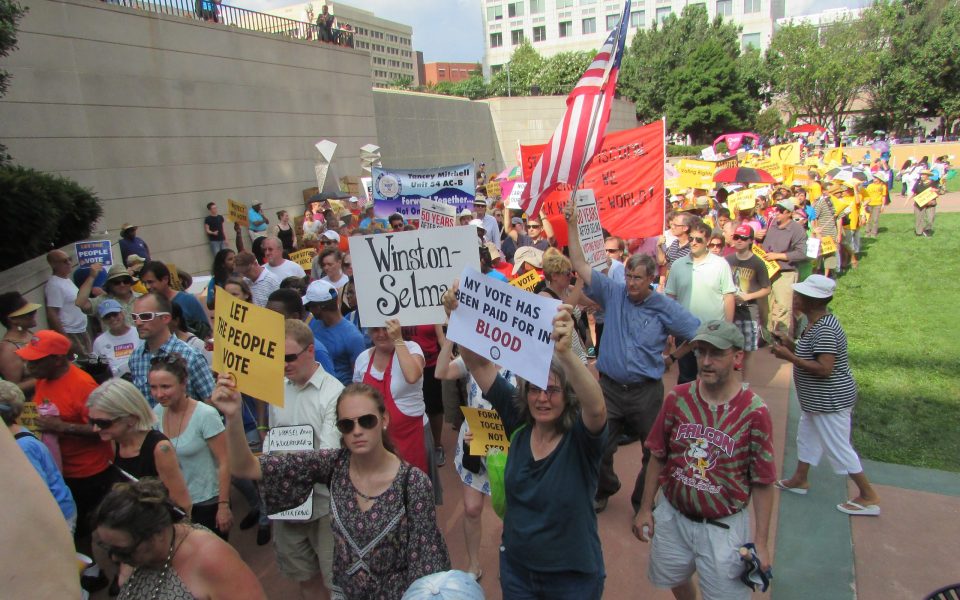Amidst a Republican-instigated hysteria over massive voter fraud, the state Board of Elections undertook an audit of the 2016 election.
Out of 4.8 million North Carolina voters participating in the 2016 general election, the state board of elections found 441 cases of voting by suspected active felons, 41 cases of non-citizens voting, 24 cases of double voting and two cases of voter impersonation. The board of elections audit, released in April 2017, noted, “It is important to recognize that suspected cases of ineligible voters casting ballots and/or committing fraud represent a tiny fraction” of the overall number of voters in the election.
This was an election in which Republican Pat McCrory lost his reelection bid by 10,277 votes, or 0.2 percent. McCrory, who refused to concede the race for 27 days after the election, pledged on election night: “We’re gonna make sure every vote counts in this election in all 100 counties… and we’re gonna need your help.”
McCrory’s volunteers came through by protesting 600 Democratic ballots, including many people who turned out to be eligible voters exercising their right to participate in the democratic process. A report released by the watchdog group Democracy North Carolina charged, “For weeks, media reports bombarded the public with allegations of voter fraud, and dozens of innocent voters had their reputations impugned and lives disrupted. Fortunately, elections officials stopped the coordinated use of phony protests to corrupt the election results, but they cannot undo the corrosive impact of voter-fraud hysteria on people’s faith in fair elections.”
The inherent sore-losery of searching for phantom systemic voter fraud was not limited to the losers. Chafing under the reminder that he lost the popular vote while carrying the electoral vote, President Trump began making the unsubstantiated and false claim that the popular vote was “stolen” millions of votes by noncitizens. In a case study for how fantasy can warp reality, NPR political reporter Mara Liasson asked then-Press Secretary Sean Spicer on Jan. 24, 2017: “If 3 to 5 million people voted illegally, that is a scandal of astronomical proportions. Doesn’t [President Trump] want to restore Americans’ faith in their ballot system? Wouldn’t he want an investigation of this?”
Spicer responded, “Well, maybe we will.”
And sure enough, on Jan. 25, Trump tweeted: “I will be asking for a major investigation into VOTER FRAUD, including those registered in two states, those who are illegal and… even, those registered to vote who are dead (and many for a long time). Depending on results, we will strengthen up voting procedures!”
On Jan. 3, 2018, Trump quietly issued an executive order dissolving the Presidential Advisory Commission on Election Integrity, chaired by Vice President Mike Pence, before it released its final report. Of course, there never was any massive systemic voter fraud.
In North Carolina, the state board of elections referred the two cases of voter impersonation, which involved family members voting in the place of a recently deceased loved one and forging the deceased’s name, to prosecutors. Alamance County District Attorney Pat Nadolski is one of the few prosecutors in the state that has opted to pursue criminal charges against individuals caught up in the audit. The Alamance 12, as they’re known, are all people who violated election law by virtue of voting as felons on probation or parole. And considering that the courts and law enforcement disproportionately arrest and lock up people of color, it should come as no surprise that nine out of 12 are black.
[pullquote]Of course, there never was any massive systemic voter fraud.[/pullquote]Five defendants interviewed by the New York Times said they didn’t know that what they were doing was a crime. In many states, it isn’t a crime. In Pennsylvania, Ohio and 12 other states, along with the District of Columbia, voting rights are automatically restored once an offender is released from prison. In Maine and Vermont, felons are allowed to vote by absentee ballot from prison.
One of the Alamance County defendants, 28-year-old Taranta Holman, had never voted before 2016, and only did so at the urging of his mother. Considering the string offenses on his criminal record over the past 10 years — everything from B&E vehicles to misdemeanor drug possession — voting almost seems like an act of civic redemption. Holman told the Times that when relatives called him to say there was a warrant for his arrest for voting, “I thought they were playing with me.”
Ironically, Holman had seen little incentive to vote for either Hillary Clinton or Donald Trump. He seems to have learned his lesson all too well.
“Even when I get this cleared up, I still won’t vote,” Holman told the Times. “That’s too much of a risk.”
It’s worth remembering that when the student civil rights workers of the early 1960s escalated from lunch-counter sit-ins to voter-registration drives, racists in Mississippi and Alabama responded with a wave of bombings, murder and terror. And as Student Non-violent Coordinating Committee alum Charles E. Cobb recounts in the 2015 book This Nonviolent Stuff’ll Get You Killed, Southern black communities often carried firearms to defend themselves and their neighbors against intimidation while exercising the franchise.
There used to be an excuse made by people who wanted to justify their indifference: If voting changed anything, they’d make it illegal.
In many cases they have.
Join the First Amendment Society, a membership that goes directly to funding TCB‘s newsroom.
We believe that reporting can save the world.
The TCB First Amendment Society recognizes the vital role of a free, unfettered press with a bundling of local experiences designed to build community, and unique engagements with our newsroom that will help you understand, and shape, local journalism’s critical role in uplifting the people in our cities.
All revenue goes directly into the newsroom as reporters’ salaries and freelance commissions.


Leave a Reply